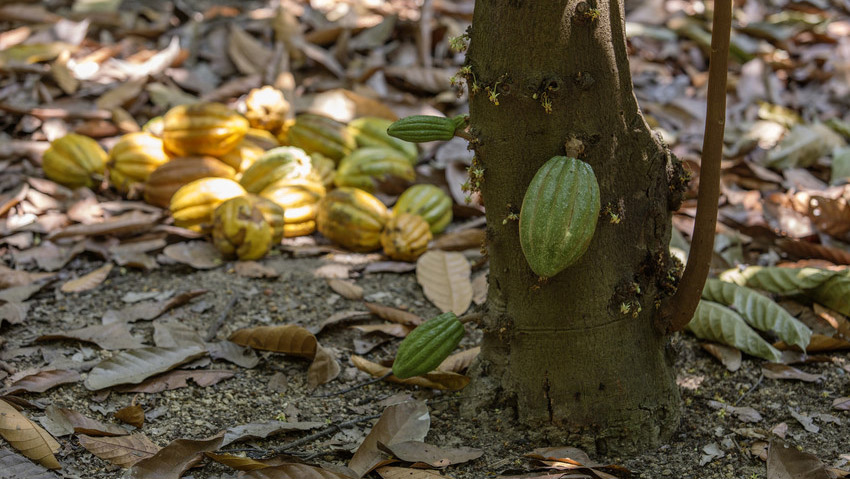A new programme is launching today to support Fairtrade certified Ivorian and Ghanaian cocoa cooperatives to strengthen prevention and remediation of child labour and forced labour, according to a joint announcement by Fairtrade International and Fairtrade Africa.
With the incidence of child labour having increased in the past decade – involving more than 1.5 million children aged five to 17 working on cocoa farms in Côte d’Ivoire and Ghana, according to a 2020 report – a change in approach is urgently needed.
The new initiative, known as the Fairtrade Child Labour and Forced Labour Prevention and Remediation Programme, will disburse funds to successful Fairtrade certified applicants for initiatives that focus on essential but often underfunded elements of strengthening children’s rights and ending harmful practices.
Fairtrade aims to support producer organisations to invest in prevention – such as improving education – as well as remediation of detected cases.
Edward Akapire, Director of Fairtrade Africa’s West Africa Network
‘There has been a great deal of attention paid to monitoring and finding child labour cases in the cocoa sector in Côte d’Ivoire and Ghana especially, which is necessary but not sufficient to really get at the root of the problem,’ said Edward Akapire, the Director of Fairtrade Africa’s West Africa Network.
‘With this new programme, Fairtrade aims to support producer organisations to invest in prevention – such as improving education – as well as remediation of detected cases, which means connecting children and families with resources so that they can thrive, rather than driving harmful practices further underground.’
The Fairtrade Standards prohibit exploitative child labour, and compliance is regularly monitored on site by the certifier FLOCERT. Still, no certification system can provide a 100 percent guarantee that a product is free of child labour. In addition, while many cooperatives now have a monitoring and remediation system in place, they may lack the resources to tackle more expensive prevention and remediation measures.
Remediating child labour
The programme is being launched with €450,000 from Fairtrade Germany, Fairtrade Austria and Fairtrade Max Havelaar Switzerland and other Fairtrade organisations, and will be expanded with additional contributions.
In this way, the programme also provides an avenue for cocoa exporters, importers, manufacturers, brands and retailers in Fairtrade cocoa supply chains to support producer organisations to address and remediate child labour and forced labour, which is a new requirement in the Fairtrade Standard for Cocoa.
Taking effect on 1 July 2023, the requirement applies to supply chains that originate in high-risk regions, including Ghana and Côte d’Ivoire. Companies that buy cocoa on mass balance terms, meaning the cocoa can be mixed after it is exported and future buyers don’t know the specific cooperative that produced it, can contribute to the programme to fulfil the Fairtrade Standards support requirement.
Prevention activities such as improving access to quality education for children, and income generating activities that address household poverty, are potential areas the cocoa cooperatives might seek to address. Innovative project ideas based on cooperatives’ experiences and priorities are also an important aspect of the programme’s funding criteria.
Expertise and knowledge
Fairtrade expects the programme to finance approximately 10 proposals in the first year. Rigorous monitoring and evaluation to assess the effectiveness of interventions and to share lessons learned will be part of all funded projects. A management committee will provide expertise and the latest knowledge on best practices. The committee includes Matthias Lange, Executive Director of the International Cocoa Initiative (ICI), an organisation dedicated to eliminating child labour in the cocoa sector and a key project collaborator.
‘We recognise that the programme cannot cover all the needs for investment in prevention and remediation activities,’ emphasised Jon Walker, Senior Cocoa Advisor for Fairtrade International.
We know we can accelerate positive change that benefits everyone.
‘However, it will help some cooperatives to fund projects that they consider most urgent on the way to eliminating child and forced labour, and providing valuable learnings for possible scale-up. With the combination of this programme and the requirement for all supply chain actors to support cooperatives, we know we can accelerate positive change that benefits everyone.’
Fairtrade certified cocoa producer organisations in Ghana and Côte d’Ivoire can find more information about the programme and the application process at the Fairtrade Africa website. Traders who want more information on contributing to the fund can contact their local National Fairtrade Organisation.
– ENDS-
For more information email: press@fairtrade.net
Notes to editors
About Fairtrade International
Fairtrade changes the way trade works through better prices, decent working conditions, and a fairer deal for farmers and workers in developing countries. Fairtrade International is an independent non-profit organisation representing more than two million small-scale farmers and workers worldwide. It owns the FAIRTRADE Mark, a registered trademark of Fairtrade that appears on more than 37,000 products. Beyond certification, Fairtrade International and its member organisations empower producers, partner with businesses, engage consumers, and advocate for a fair and sustainable future. Find out more at www.fairtrade.net
About Fairtrade Africa
Fairtrade Africa is a member of Fairtrade International and serves as the umbrella network organisation representing and supporting Fairtrade certified producer organisations in Africa and the Middle East. Established in 2005 and with the secretariat based in Nairobi, Fairtrade Africa has four regional networks: Eastern and Central Africa; Southern Africa; West Africa; and the Middle East and North Africa. Fairtrade Africa currently represents more than 1.3 million farmers and workers in 660 producer organisations spread across 28 countries in Africa and the Middle East by providing services that contribute to the improvement of their livelihoods.
